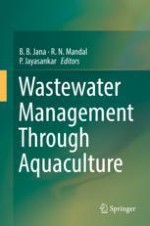2018 | OriginalPaper | Buchkapitel
13. Multiple Reuse of Wastewater: Economic Perspectives
verfasst von : S. Jana, Ken Gnanakan, B. B. Jana
Erschienen in: Wastewater Management Through Aquaculture
Verlag: Springer Singapore
Aktivieren Sie unsere intelligente Suche, um passende Fachinhalte oder Patente zu finden.
Wählen Sie Textabschnitte aus um mit Künstlicher Intelligenz passenden Patente zu finden. powered by
Markieren Sie Textabschnitte, um KI-gestützt weitere passende Inhalte zu finden. powered by
